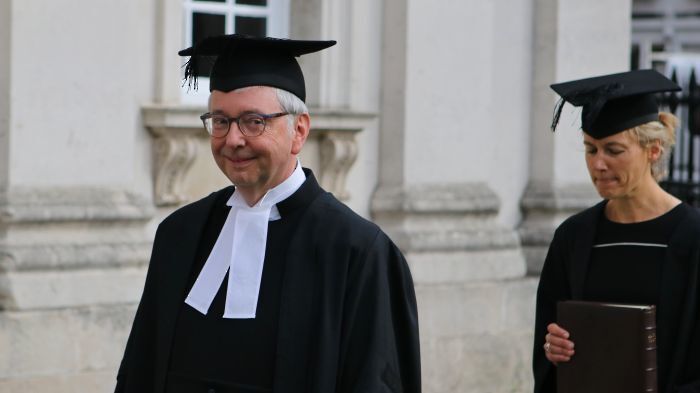Cambridge UCU rejects national agreement to end strikes
The University branch of the union for academics and staff has rejected an agreement between UUK and UCU, as the occupation of Old Schools continues
● Live: Students occupy central University building

The Cambridge branch of the University and College Union (UCU) passed a motion this morning to reject the agreement put forth by national negotiating bodies, which brought the national pensions dispute and ongoing strike action closer to a resolution than ever before.
At an emergency meeting at Great St Mary’s church morning, academics debated whether to accept a national agreement reached yesterday between UCU and Universities UK (UUK) during reconciliation talks. If accepted, the agreement could bring about an end to strikes tomorrow.
At the meeting, which was called last night, the room narrowly rejected an amendment proposed by Cambridge UCU branch secretary Dr Waseem Yaqoob. Dr. Yaqoob’s motion proposed accepting the national agreement, on the condition that the inflation cap be removed and that members not be forced to reschedule missed lectures.
Various speakers addressed the crowd from the front of the chamber, some arguing to accept, and others to reject, the agreement. The consensus in the room, however, was to reject the agreement proposed.
What concessions have been made?
Speakers opposed the national agreement on the grounds that the ‘transitional benefit arrangement’ will be revisited three years after its implementation on 1st April 2019. One member said: “this is a time to break from the past”, emphasising that “it is utterly vital to resist the negotiation now”, which they called “watered down”.
Tensions rose in the chamber when one speaker addressed the crowd with his reasons for accepting the agreement – the minority view. He argued that union members “have public opinion to deal with”. Dr Priyamvada Gopal, a senior lecturer in English at Churchill College and outspoken critic of the UUK’s pensions proposals, said loudly from the audience: “Oh, come on”, and later called his arguments “patriarchal bullshit”.
The next speakers, who also spoke in favour of accepting the argument, were met with loud criticism and interruptions from various members of the audience, including, at one point, Dr Jeff Miley, a lecturer in the Sociology department and and senior Cambridge UCU member, yelling loudly, “Let us talk!”
Yaqoob argued that, in passing a resolution that categorically rejected the national agreement, UCU members risked having the earlier proposal, agreed to by Universities UK in January, “legally imposed on us” later this year.
Much sadness but also incredible resolve here. @CambridgeUCU votes overwhelmingly to reject the proposed cuts. Make us a better offer, @UniversitiesUK
- Nicholas Guyatt (@NicholasGuyatt) 13 March 2018
The UCU Higher Education committee (HEC) met today at 11am to discuss with branch representatives – including Cambridge UCU vice-president Dr. Sam James – the proposal agreed to by UUK and UCU representatives in negotiations yesterday.
Vice-chancellor Stephen Toope yesterday announced that the University would be willing to make higher contributions to employee pensions, in order to “support a defined benefit pension”.
Most of the full chamber in Cambridge, filled with around 150 UCU members, voted in favour of the unamended motion, with just a handful of hands raised in favour of accepting the agreement. The outcome was passed on to branch representative Dr Sam James, who represented the Cambridge UCU at the HEC meeting this morning. At the meeting, the national UCU will decide whether to stop industrial action tomorrow, 14th March, contingent on whether the agreement is accepted.
Speaking at the emergency meeting, Dr Gopal, however, criticised the national UCU’s ability to represent its branches. She said: “This is a union [which] has been more than moderate on our behalves”, and references instances in 2006 and 2015 when they “weakened our actions”.
She stressed the importance of voting now “to break the relentless cycle of degeneration”, and added: “They will come back in three years’ time, they will come back for defined benefit, and when they come back, they will come back for other things as well”, including “freedom of speech on campuses”.
“So I think it is vital, utterly vital, to not give in to the temptation to give in now.”
 News / Caius mourns its tree-mendous loss23 December 2025
News / Caius mourns its tree-mendous loss23 December 2025 Comment / Yes, I’m brown – but I have more important things to say22 December 2025
Comment / Yes, I’m brown – but I have more important things to say22 December 2025 News / Clare Hall spent over £500k opposing busway 24 December 2025
News / Clare Hall spent over £500k opposing busway 24 December 2025 Interviews / Politics, your own way: Tilly Middlehurst on speaking out21 December 2025
Interviews / Politics, your own way: Tilly Middlehurst on speaking out21 December 2025 News / King appoints Peterhouse chaplain to Westminster Abbey22 December 2025
News / King appoints Peterhouse chaplain to Westminster Abbey22 December 2025










